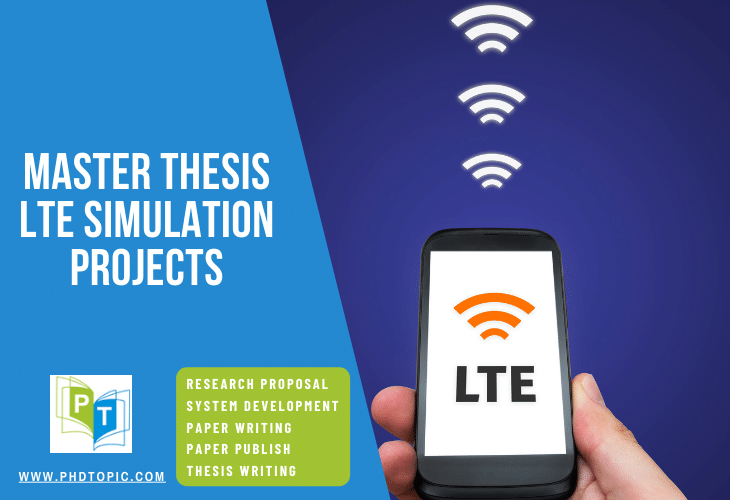Master Thesis LTE Simulation Projects
Master Thesis LTE Simulation Projects is our prime service rendered by us also for students and research scholars in worldwide. We also have world class experts who know all major research fields, and they are also aware of current technology and techniques to make your Master Projects in the most effective and standard manner. A computer is never superior to the human mind; similarly, our expert’s knowledge is like the ocean because they have ten years of work experience in all domains.
Our LTE Simulation Projects is created with the aid of serving our students in every aspect of their research. We also have strong tie-ups with the world’s top universities and colleges, where we also offer 5000+ projects for students. The beginning is the most important part of the work. So start to work today; it is just the beginning also for your research program.
Thesis LTE Simulation Projects
Master Thesis LTE Simulation Projects is our life where we doing, creating, making, delivering, and sharing are only for students and scholars. Students and scholars who face issues during your Master’s Degree Program can come to our organization. We have 150+ world-class engineers who can surely guide you until your graduation completion. Our organization has ISO 9001.2000 certification where we also offer only quality projects for students, and also they feel more satisfied with our services. Our service is completely different from other institutions due to our expertise and experience. You can also share your own ideas with our experts. They can develop and also deliver to you before the deadline. Now, just take a look at LTE Simulation.
 Research Issues of LTE Simulation
Research Issues of LTE Simulation
- LTE Resource Scheduling
- Mobile Security
- LTE Data Services [also in Voice services]
- QoS and Traffic Management
- Mobile services and also developer programs
- Networking the Towers
- TCP Performance Issues
- Mobility management
- Low data speeds
- Issues also based on Network Band
- Call drop also based on issues
- QoE issues
- LTE Roaming
- Latency increases
- IP Services also in utilization
- Power consumptions
- Lack of Quality of Service
Simple Steps for LTE Simulation
- Define the Scenario also to be simulated in LTE
- Write a simulation program also that desired network topology or architecture
- Set the configuration parameters that are being also used for the LTE Simulation
- Configure the desired output (simulation results) to be produced also by the simulator
- Run the Simulation
Support for LTE Simulation Tools, and Software
Support for Simulators:
- SimuLTE
- 4G LTE Dynamic Simulator
- LTESim
- LTE System Toolbox
- NS3 [LENA Simulator]
- OMNeT++
- OPNET [OPNET Modeler]
- SimuLTE also with OMNeT++
- UE Simulator
- VoLTE Simulator
- LTE Protocol Simulator
- OpenLTE
- LTE PHY Lab
- Vienna LTE-A Simulator
- LTE eNodeB Emulator
Support for Software:
- LTE eNodeB Software
- Embedded NB-IoT Modem
- LTE System Toolbox
- Atoll Radio Planning Software
- Python LTE Software [PyLTEs]
- Matlab Simulink also based LTE simulator
Supported Programming Languages:
- JAVA
- C/C++
- OO Programming
- MATLAB
- Python
- Ruby
Support for LTE Module:
- PDCP-RRC Module
- RLC Module
- MAC Module
- PHY also using Module
Support for Platforms
- Linux Ubuntu
- iOS9
- Android OS
- Windows 10 [64 bit]
Major Research Areas in LTE Simulation:
- 4G Radio Technology
- Packet Scheduling
- Various MIMO techniques
- OFDMA Technology
- Multi hop Transmission Strategy
- Multi cell Cooperation Tx/Rx (CoMP)
- Channel or Carrier Aggregation
- Small cell solution/Densification
- 5G networks
- LTE, LTE-A and also in LTE-U Networks management
- Policy and autonomics management
- Wi-Fi, and also Wimax Technology
- Inference management also in Heterogeneous networks
- Antenna Technology
LTE Simulation Configuration Parameters
- Handover parameter
- Packet size
- TCP protocol
- Simulation time
- No of UEs with Relay Node
- Advertised Window Size
- Queue Scheme
- Maximum Window Size
- Cache Options
- Scheduler settings
- Debug options
- CQI mapper options
- Plotting options
- And also in Random number generation parameters
Latest LTE Simulation Projects Topics
- Licensed or unlicensed aggregation carrier aggregation also based on Resource Allocation for MIMO Systems
- Frame based LBT based on Machine Type Communications also with Wi-Fi Harmonizing Coexistence
- Radio channel emulation also based on Clustering for automotive wireless systems over the air testing
- Envelope Tracking Power Amplifiers Behavior Modeling also using Saleh Model
- RACE: Rapid Cellular Framework also for Automotive network simulation scenarios
- Future and actual mobile communication of 5G/WLAN/LTE Networks also using automotive antenna
- Design of Closely located Radiators, high efficiency and also low band MIMO with LTE Handset Antenna in LTE Networks
- Power adjustment and location recommendation also for device to device communications underlying LTE cellular networks
- LTE MIMO Antennas Evaluation also in Automotive Applications
- 2D piecewise behavioral model also for highly non-linear dual band transmitters
- Numerous smart devices in Energy Internet also based on Dynamic QoS –Driven Access Scheduling
- Iterative decoding and also the performance gap between ML of MIMO systems also with Finite Length Turbo-coded BICM
- Design and performance evaluation of HARQ feedback also in unlicensed spectrum LTE
